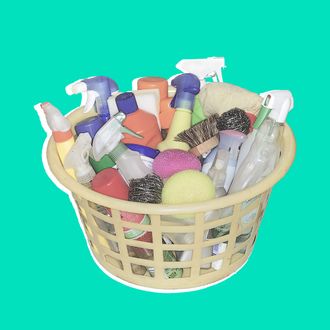
Maybe you have the best of house-keeping intentions, but, somehow, your place always ends up looking like some kind of laundry-spewing tornado stormed through it. You could try forcing yourself to clean on a regular basis, maybe by setting a series of Just do it already!!! reminders on your phone. But a more realistic method might be to gently nudge yourself into it, says Paul Dolan, the behavioral scientist and author of the new book Happiness by Design: Change What You Do, Not How You Think. (Science of Us talked to Dolan earlier about another one of his happiness theories, by the way: Whenever he goes to a restaurant, he lets his friends order his food.)
In the book, Dolan cites research showing that when people are exposed to citrus-scented air fresheners, they feel more compelled to tidy up. He’s talking about this 2005 paper in Psychological Science (delightfully titled “Smells Like Clean Spirit”). Here’s the gist: A team of Dutch researchers sat study participants in either a room that smelled citrus-y, or in a room that was unscented. Then everybody got a very crumbly cookie. The people who’d been exposed to the citrus smell stopped several times to clean up the crumbs, whereas the people who’d been in the unscented room only stopped once, on average.
But only one person in the crumbly cookie study even reported noticing the citrus smell, and none of the participants said they were concerned with tidying while they were eating. They seemed to have made the decision to clean, or not, on an unconscious level. As Dolan explained in a recent interview with Science of Us, “the brain looks to make associations to assist in decision-making,” something researchers call environmental cues. “So the smell of cleanliness primes the desire to be clean,” Dolan said. “Also, places that are clean generally smell clean, so the association is reinforced.”
Are there more ways to trick yourself into keeping your place clean? Yes, probably! Dolan expanded on that:
Another environmental cue you could consider is to simply leave your cleaning products out so that you are reminded of them and they are easy to use.
In addition to priming, consider acting on the other three design principles in the book, too: defaults, commitments, and social norms. To default yourself into being tidier, for example, you could consider investing in products and/or arrangements that automatically need less cleaning: frost-free freezers, fewer knick-knacks lying around to collect dust, automatic vacuum cleaners, etc.For commitments, public ones work best, so let people know you’ll be cleaning, make a plan to do it, and schedule yourself time.
As for norms, invite a clean friend around or someone you feel embarrassed being messy around to provide you with the motivation to tidy up before their visit (or even whilst they are there).
On the other hand, it’s worth asking yourself: Do you really care about keeping your place clean? Would a tidy apartment really boost your happiness all that much? For Dolan, the answer is often no. “If I had a choice between being outside with my kids on a beautiful Saturday and staying inside to make sure my desk is tidy, I’d go for the former.”




